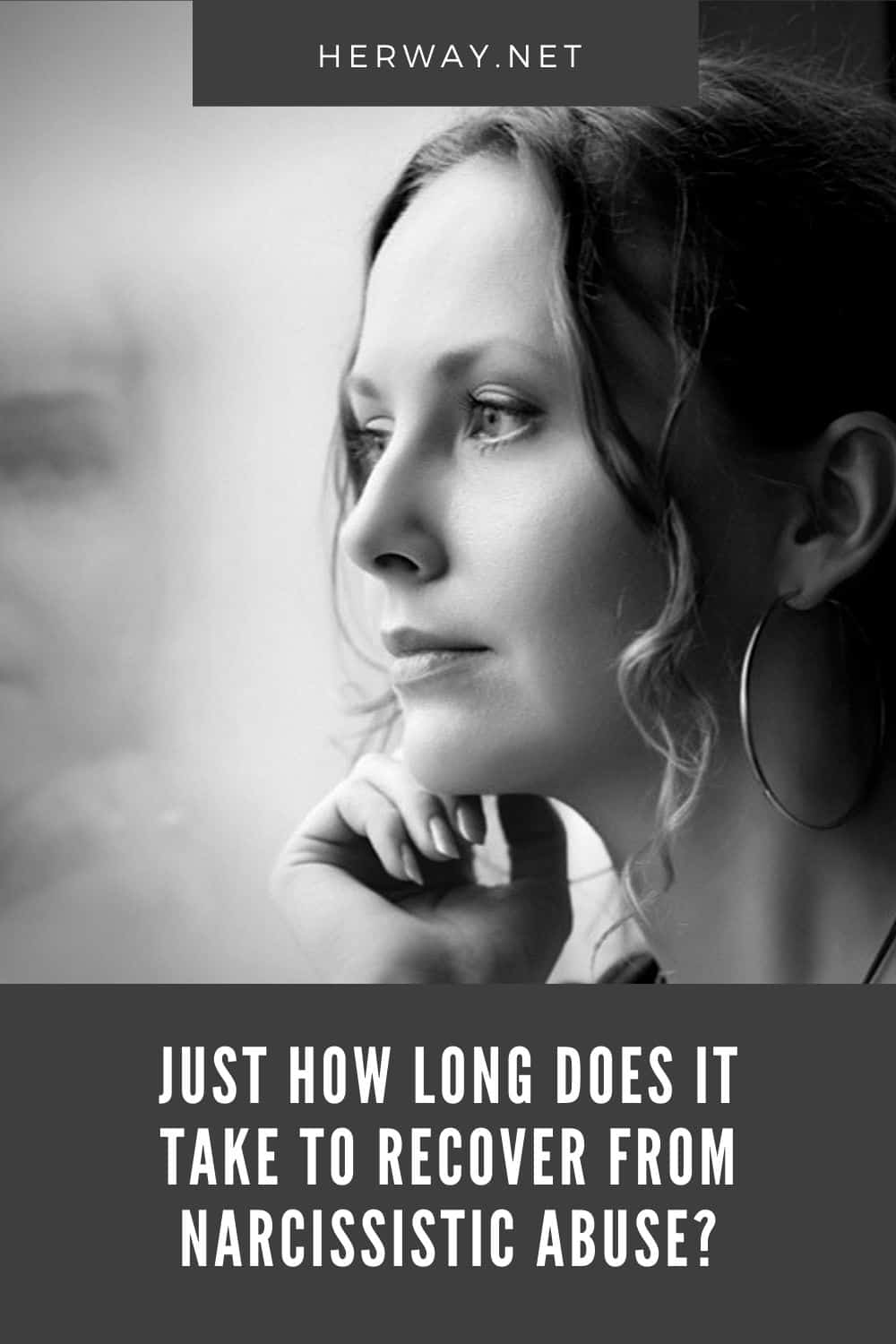Just How Long Does It Take To Recover From Narcissistic Abuse?
Recovering from a trauma bond caused by narcissist abuse is a difficult path to tread. It’s a healing journey that takes time, effort and energy.
But how long does it take to recover from narcissistic abuse?
This is a question all victims ask themselves. There you are, struggling for months or even years but you are still not fully recovered, so it’s natural to wonder when you will finally get there.
Before anything else, you have to be aware of one thing. This is a long path toward recovery and you can’t expect any magical improvement overnight.
Instead, it takes a lot of time, effort and energy to undo the impact your narcissistic abuser left on your mental health and personality. However, it can be done with the right support system.
When you ask Ph.D. experts how long does it take to recover from narcissistic abuse, they will tell you that the average time a victim needs for healing is twelve to eighteen months.
Nevertheless, they will also point out that there are certain phases every victim goes through during their journey.
Denial

You’ve heard about narcissistic and toxic people and you know that such a thing as narcissistic abuse exists out there. However, like the rest of the world, you are convinced that this can’t happen to you.
So, naturally, you deny everything you’re going through at first. You simply refuse to accept that you, of all people, have become a victim of narcissistic abuse.
All the red flags are there but you keep convincing yourself that you’re not seeing them right. Maybe you’re exaggerating. Maybe your abuser is not so bad after all.
It’s possible that you’re just being too sensitive.
There is no way in hell that you’ve spent all this time with someone so toxic and essentially evil. You would have seen the signs earlier.
Your best friends and closest family members might be trying to open your eyes but nothing helps.
Of course, the fact that your narcissist keeps on gaslighting you and making you look like the crazy one doesn’t help.
However, the thing is that this stage is good, despite the denial. It means that you’ve started reconsidering your narcissistic relationship and finally begun doubting it.
This is the start of something bigger; the start of your long and difficult healing journey. Nevertheless, this is crucial because it’s some kind of progress.
You’ve finally moved from the dead spot and you’ve stepped onto the right track.
Guilt

When you’re wondering how long does it take to recover from narcissistic abuse, you have to be aware of one thing.
This healing isn’t linear and it has its ups and downs.
You would probably expect acceptance to come right after denial. However, sadly, things don’t work in such a simple manner.
In fact, after the initial phase, you start feeling guilty. At first, you blame yourself for even accusing your partner of being a narcissist.
After a while, when you start to investigate more about narcissistic personality traits and once you recognize most of them in your partner, you also feel guilty.
Guilt attacks you from different directions. You can’t believe that you were so foolish to get involved with this kind of toxic sociopath.
How come you didn’t see the signs before? How could have you been so stupid not to recognize the red flags which were so obvious?
Most importantly, how is it possible that you’ve stayed next to this person for so long? When did you lose all of your self-respect?
How could you allow them to treat you this way for all of this time? Did you lose yourself completely?
These are all the questions running through your head. Instead of putting all the responsibility on your abuser because they’re the only one guilty, you do the opposite.
You see, you’ve been so brainwashed to the point that you even blame yourself for being their victim.
You might not see it now but this is also one of your subconscious attempts to absolve them from all guilt.
Anger

The next stage also consists of negative emotions and the predominant one is anger.
You’re still not ready to process your pain and everything you’ve been through so, it’s much easier for you to be angry; angry at your abuser, angry at yourself for choosing them and for staying with them and angry at the universe for putting you in this situation.
It’s much easier to admit that you’re angry than accept that you’re hurt and heartbroken.
At this point, one can say that you even hate your abuser. You want them to go through the same things you went through.
You want to get even. You plot your revenge and the only thing which manages to calm you is picturing them in emotional pain.
Most victims don’t actually do anything about this. However, they do think about revenge since it becomes their defense mechanism.
You assume that this is the only way to regain your confidence and dignity. The abuser has to suffer the same way you did and that’s the only way for you to stop feeling humiliated.
Well, trust me on this one; anger is never better than sadness. One way or another, you still have feelings for your narcissist.
Besides, revenge won’t heal your broken heart. It might repair your crushed ego but that won’t magically erase all of your deeply rooted traumas.
Bargaining

This is probably the last thing you expect when you’re trying to figure out how long does it take to recover from narcissistic abuse but after anger there comes a stage called bargaining.
Before this phase, you were determined to do everything in your power to hurt your abuser. You hated them and decided never to go back to them.
At least, that is what you thought went on but actually, the truth is different. In fact, you’re still very much labile and the biggest proof of your instability is the fact that you slip back into hope.
It’s completely unexpected but you start to bargain with yourself about the ways to help your narcissist.
You try to run away from it but the initial anger is gone and now hope arises; hope that this person will change, hope that you can help them and hope that your narcissistic relationship has a way out.
You think about all the what-ifs. You consider all the potential your narcissist has and everything they could become if they just agree to make some slight modifications in their personality.
It is likely that you’ll revive contact with your abuser during this time. Naturally, this doesn’t help your recovery process.
What you mustn’t forget is that these toxic people are skillful manipulators and it’s expected for them to try and turn the tables.
In fact, there is a possibility that your abuser will do their best to represent themselves as your victim.
On a conscious level, you’ll never believe them. However, deep down, you will want to let them back in in your life and therefore, you’ll have the desire to accept their excuses.
The no contact phase

I won’t lie to you, this will probably be the most difficult stage of your marathon recovery process.
After all, this is the first actual move you make toward your narcissist since all the previous ones took place in your head and heart.
When you want to escape your abusive relationship and are wondering how long does it take to get over narcissistic abuse, the most important part is to cut all ties with your abuser and go no contact.
Be aware that this person suffers from a severe narcissistic personality disorder so forget the idea of staying on friendly terms with them.
I won’t lie to you; there is no civilized way of doing this. You won’t be able to explain to them in a nice way that you want out and there is no ‘seeing them just once for the last time’.
Instead, you’ll just have to move as far away from them as possible. Block their social media accounts, cut ties with all of your mutual friends and it will probably be necessary to change your number.
This will be harder if you have a toxic relationship with a narcissistic parent, a co-worker or a spouse that you’ll have to keep on co-parenting with.
After all, these are the people you have to stay in some kind of contact with.
If this is a co-worker or a co-parent, please limit your communication to work or kids-related topics and don’t engage in any other conversation.
On the other hand, if we’re talking about a narcissistic parent, please forget about your family ties and guilt.
You’re an adult and you can and must cut ties with them, despite your blood connection.
Either way, the most important part is to ignore the narcissist as much as possible.
I know that you will probably have the urge to fight with them and call them out on their actions but trust me—that won’t get you anywhere.
You see, a narcissistic supply depends on your reaction. It doesn’t matter what kind of reaction we’re talking about; for them, it’s enough to notice that they’ve managed to get to you.
That is exactly why you have to pretend that they don’t exist. Be as boring as possible to your abuser and eventually, they’ll give up on you.
Of course, that won’t magically heal their NPD. Unfortunately, they’ll just move on to their next victim but there is nothing you can do to change that.
Picking yourself back up

After you’re done with the previous stage, better times are coming and you’re slowly figuring out how long does it take to heal from narcissistic abuse.
Now you’re finally free to pick yourself up from the ashes that this emotional abuse has put you through.
This is the phase in which you have to learn to love yourself again. The phase in which you need to put yourself in first place and the phase which is all about regaining your self-esteem.
Basically, what you have to do is empower yourself all over again. Work on yourself and most importantly, keep yourself as busy as possible.
No, your narcissistic abuser won’t magically fade away from your mind but it’s your job to work on kicking them out of there.
A lot of victims of narcissistic abuse don’t have what it takes to go through all of this alone. Instead, they need a support system that includes help from their loved ones or from professional experts.
Please, don’t hesitate to ask for help.
You’re not weak, you’re dealing with a person who suffers from a severe narcissistic personality disorder and it is only natural that you can’t get away from their clutches by yourself.
There are numerous support groups available for victims of narcissistic abuse, where you can hear loads of stories from people who have gone through the same traumas you have.
This will help you see that you’re not alone. You’re surrounded by your loved ones and by others who are willing to help you.
Rebuilding your identity

One of the hardest parts of narcissistic abuse recovery is rebuilding yourself.
Your narcissistic ex wiped away the personality you had before you met them and the trauma bond you had with them changed the essence of who you are.
So, now is the time to find the person you were in the past.
I’ll be honest here; this traumatic experience will leave traces on your mental health. With time, your emotional wounds will eventually heal but the scars will remain forever.
No, this doesn’t mean that you’re broken beyond repair; I’m just trying to tell you not to hope that you will go back to being exactly the same person you were before this person marched through your life.
However, what you have to do is to rebuild a new identity, an identity that won’t be dependent on your abuser but which also won’t be the same as the one you had before them.
The hardest part is having to reinvent yourself. After all this time, you lost track of who you are. What are the things you like and don’t like about yourself?
What traits are really yours and which ones did you create in order to be more appealing to your narcissist?
Reality check

Despite what you might think, during all of these stages, your narcissistic abuser is still very much present in your mind and heart.
There are still moments in time when you feel like giving up and when there appear rays of hope that your narcissistic ex might change and that they are your soulmates.
Nevertheless, this is the stage in which you finally take off your rose-tinted glasses. After all this time, you see reality in its true form at last.
You stop making excuses for your partner’s toxic behavior. You no longer justify the narcissist abuse and you stop blaming yourself for everything that went on.
You no longer hope that they’ll become an empath or a kind person.
You understand that they suffer from a serious mental illness, that they need help and that you can’t do anything about it.
At first, this reality check is quite painful. However, as time goes on, it brings you liberation. Finally, you’re freed from this person’s chains.
You realize that their behavior patterns are not normal and that you shouldn’t expect the same treatment from everyone else in your surroundings.
If we’re talking about an ex-romantic partner you’ve been trying to escape from, this is also the time when you might start dating again.
Optimism wakes up inside of you and for the first time ever, you see a light at the end of the tunnel.
However, I’ll have to ask you to be extremely careful when it comes to rebound relationships. You’re still extremely fragile and you could easily fall for someone’s love bombing all over again.
Acceptance and forgiveness

After reality hits you hard in the face, it’s time to accept and forgive and first of all, you stop looking for closure. You understand that you’ll never get the explanation you crave.
The bottom line is that there is no logical reason why all of this happened.
At the same time, you no longer try to run away from your past. You don’t let it define you but you know there is no point in trying to escape something that is a part of you.
Most importantly, you understand the significance of forgiveness. You don’t forget everything you experienced but you do forgive.
First and foremost, you forgive yourself for all of your wrong choices and you understand that you’re not crazy or stupid.
You were a victim and the victim is never to blame. You accept your errors, without allowing them to make you doubt your self-worth.
Finally, you manage to find the strength to forgive your narcissistic abuser. You don’t want them back, not even if your life depended on it, but you forgive them.
Now, you’re smart enough to know that your resentment and grudges are only harming you.
You realize that the only way to truly free yourself from this person’s impact is to let go of anger and all other negative emotions.
This is when you become indifferent and when you succeed in getting rid of them.
Learned lessons

When you’re wondering how long does it take to recover from narcissistic abuse, you usually forget about what comes afterward.
You forget one important thing: the lessons this narcissistic relationship has taught you.
Only once you see that you’ve learned something from this awful experience can you tell that you’re fully recovered.
First and foremost, you’ll learn to put yourself in first place and you’ll start to worry about your own well-being and mental health.
You’ll see your self-worth, you’ll engage in self-care and you’ll learn to love yourself more than anyone else.
Also, you’ll build your self-esteem to unimaginable heights. You’ll understand that you’re your own soul mate and that you don’t actually need anyone to emotionally depend on.
Most importantly, this relationship will teach you what love is not. You’ll learn to recognize things such as love bombing, manipulation and other tactics that narcissists use to lure their victims.
This experience is painful, there is no doubt about that. However, it is also valuable, since it will make you stronger than ever.








